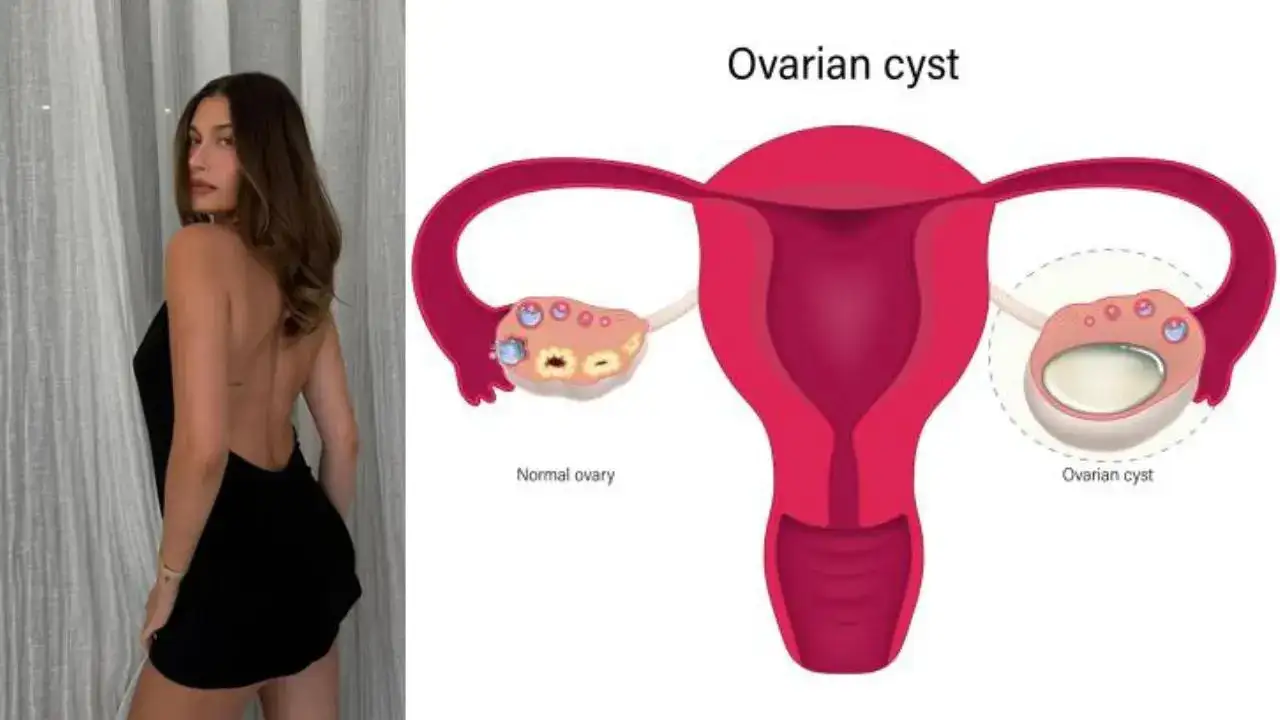
While ovarian cysts are not uncommon, in a few women ruptured cysts can lead to extremely serious symptoms (Pic: Instagram/iStock)
Hailey Bieber has revealed she has been diagnosed with two ovarian cysts. The 28-year-old model, married to pop star Justin Bieber, posted on her Instagram Stories showing off her stomach and sharing the health update. “Currently have 2 ovarian cysts,” she wrote. “If you deal with ovarian cysts, I’m right there with ya,” the post read.
While ovarian cysts are not uncommon, as experts say many women have ovarian cysts at some time and can present little or no discomfort, in a few people large or ruptured cysts can lead to extremely serious symptoms.
While Hailey has not shared any details about her health, she has had a history of dealing with cysts. In 2022, the Rhode skincare founder revealed she had an ovarian cyst “the size of an apple,” sharing a photo of herself with her shirt pulled up that revealed her stomach. However, she made clear she did not have endometriosis or PCOS—both conditions that lead to cyst formation.
While Hailey at that time had not provided any further information about her cyst, she did say it was painful and made her achy and "feel nauseous and bloated and crampy and emotional."
What are ovarian cysts?
An ovarian cyst is a small sac filled with fluid or semisolid material that forms on or within one or both of your ovaries. There are different types of cysts, most of which are usually painless and noncancerous. While they do not always cause symptoms, you likely will not even know you have one unless your doctor finds one during a pelvic exam or pelvic ultrasound.
Cysts are usually commonly found in women who have not undergone menopause.
Doctors say while most ovarian cysts are harmless and eventually go away on their own, some types are more likely to become cancerous or cause complications. Less than one per cent of ovarian cysts are cancerous.
Signs and symptoms of ovarian cysts
While some smaller cysts do not cause any symptoms and you may not even know you have a cyst, a few larger ones may cause:
- Pelvic pain or a dull backache
- A feeling of fullness and bloating in your lower belly
- Pain during sex
- Painful and irregular periods
- Trouble in bowel movements and peeing
What causes an ovarian cyst?
Doctors say the leading cause of an ovarian cyst is ovulation—a natural process that happens during your menstrual cycle. A few other causes include:
Abnormal cell reproduction
Unusual cell reproduction leads to dermoid cysts or cystadenomas forming.
Endometriosis
Endometriomas—also known as chocolate cysts - often form on your ovary if you have advanced endometriosis.
Polycystic ovary syndrome
PCOS can cause multiple small cysts to form on your ovaries.
Pelvic inflammatory disease
Severe pelvic infections can spread to your ovaries, causing cysts.
What are the risk factors for ovarian cysts?
While anyone with ovaries can develop an ovarian cyst, your chances increase with:
Age
Ovarian cysts are more common if you have not gone through menopause
Pregnancy status
Doctors say you are more likely to have cysts during pregnancy
History
You are also more likely to have an ovarian cyst if you have had one before
Medical conditions
You are more likely to get an ovarian cyst if you have endometriosis, PCOS, or another hormone disorder.
Fertility medication
If you are taking medications to help with ovulation, you may get cysts.
Get Latest News Live on Times Now along with Breaking News and Top Headlines from Health and around the world.
